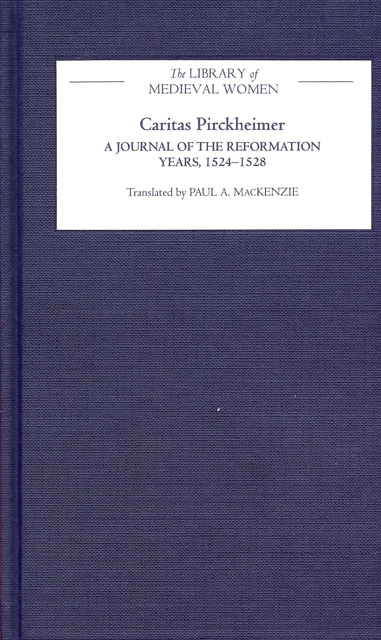Book contents
- Frontmatter
- Contents
- Acknowledgments
- Introduction: The Life and Times of Caritas Pirckheimer of Nürnberg
- A Note on the Manuscripts
- Text: A Journal of the Reformation Years 1524–1528
- Interpretive Essay: The Rebellion of the Abbess of St. Clare’s
- Annotated Bibliography
- Index
- Library of Medieval Women
Introduction: The Life and Times of Caritas Pirckheimer of Nürnberg
Published online by Cambridge University Press: 18 March 2023
- Frontmatter
- Contents
- Acknowledgments
- Introduction: The Life and Times of Caritas Pirckheimer of Nürnberg
- A Note on the Manuscripts
- Text: A Journal of the Reformation Years 1524–1528
- Interpretive Essay: The Rebellion of the Abbess of St. Clare’s
- Annotated Bibliography
- Index
- Library of Medieval Women
Summary
When Caritas Pirckheimer, abbess of the Nürnberg cloister of St. Clare’s, died in 1532, her obituary in the cloister's Totenbüchlein included the simple words “a mirror of all piety and learning and a lover of all virtues.” The unique role that she played in defending her cloister and her faith during the period when the Reformation was formally accepted by the City Council of Nürnberg in 1525, however, remained largely unappreciated and unknown until the Bamberg archivist Constantin Höfler first published the manuscript of her personal account of that time in 1852, giving it the curious title of Denkwürdigkeiten (things worth thinking about). There has never been a complete English translation of this important document. The title A Journal of the Reformation Years 1524–1528 seemed more appropriate and accurate than a literal translation of Höf ler's vague and arcane title.
Barbara Pirckheimer was born on 21 March 1467 in Eichstatt, Germany, the daughter of Dr. Hans Pirckheimer who, like his son and grandsons after him, studied in Italy, eventually earning a doctorate in Padua, Italy. Since Hans was in the service of the Archbishop of Eichstatt, the family lived in that city, although their ties to Nürnberg remained strong. The earliest mention of the family in Nürnberg dates from 1359. Barbara was the first of twelve children born into this well-to-do patrician family. Her brother Willibald (1470–1530) was born on 5 December 1470 and was to become the foremost representative of humanism in Germany, a leading figure in Nürnberg's Renaissance and Albrecht Dürer's best friend. Two Pirckheimer children died young. Seven of Barbara's eight sisters were to follow her example and take the veil. Her other sister, Juliane, married Martin Geuder, a high-ranking civic official. Thus the Pirckheimer women followed the two most common “options” for females at that time, marriage and the Church.
Why did Caritas Pirckheimer become a nun? As a child she enjoyed a rather sheltered and care-free life. When Hans Pirckheimer accepted a position as councilor to Duke Albrecht IV of Bavaria, the family moved to Munich. Hans undertook the teaching of his son Willibald himself and, significantly, his daughter Barbara also was permitted to participate. When she was twelve, she was sent to St. Clare's in Nürnberg in order to further her education. In addition to her father's tutoring, she had received instruction in Latin from her aunt and was well-prepared for the convent school.
- Type
- Chapter
- Information
- Caritas PirckheimerA Journal of the Reformation Years, 1524-1528, pp. 1 - 9Publisher: Boydell & BrewerPrint publication year: 2006



